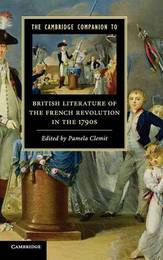
|
The Cambridge Companion to British Literature of the French Revolution in the 1790s
Hardback
Main Details
| Title |
The Cambridge Companion to British Literature of the French Revolution in the 1790s
|
| Authors and Contributors |
Edited by Pamela Clemit
|
| Series | Cambridge Companions to Literature |
|---|
| Physical Properties |
| Format:Hardback | | Pages:262 | | Dimensions(mm): Height 235,Width 155 |
|
| Category/Genre | Literary studies - c 1500 to c 1800
Literary reference works |
|---|
| ISBN/Barcode |
9780521516075
|
| Classifications | Dewey:820.9358208 |
|---|
| Audience | | Professional & Vocational | |
|---|
| Illustrations |
12 Halftones, unspecified
|
|
Publishing Details |
| Publisher |
Cambridge University Press
|
| Imprint |
Cambridge University Press
|
| Publication Date |
10 February 2011 |
| Publication Country |
United Kingdom
|
Description
The French Revolution ignited the biggest debate on politics and society in Britain since the Civil War 150 years earlier. The public controversy lasted from the initial, positive reaction to French events in 1789 to the outlawing of the radical societies in 1799. This Cambridge Companion highlights the energy, variety and inventiveness of the literature written in response to events in France and the political reaction at home. It contains thirteen specially commissioned essays by an international team of historians and literary scholars, a chronology of events and publications, and an extensive guide to further reading. Six essays concentrate on the principal writers of the Revolution controversy: Burke, Paine, Godwin and Wollstonecraft. Others deal with popular radical culture, counter-revolutionary culture, the distinctive contribution of women writers, novels of opinion, drama, and poetry. This volume will serve as a comprehensive yet accessible reference work for students, advanced researchers and scholars.
Author Biography
Pamela Clemit is Professor of English Studies at Durham University.
Reviews'The questions [this book] raises are central to any adequate understanding of the literature of the 1790s, and central, I suspect, to an understanding of the relationship between literature and politics in any period. For that reason, and for the high quality of the individual essays, it is to be welcomed.' Richard Cronin, Notes and Queries
|